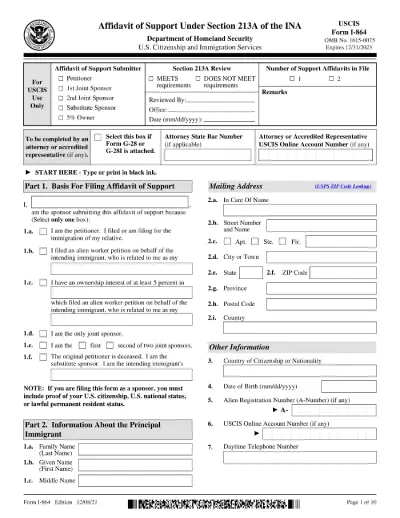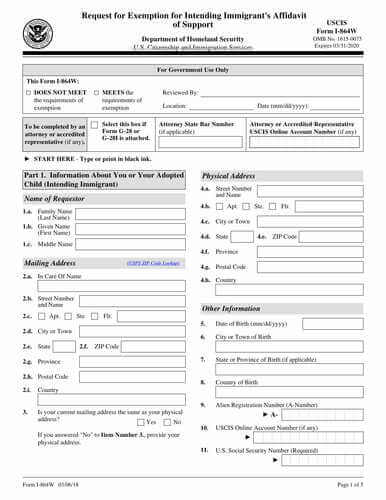The Form I-864 Affidavit of Support is a critical document needed by most immigrants who come because of family ties or job opportunities. This affidavit assures that the intending immigrant will have sufficient financial support upon their arrival in the United States.
The sponsor completing the form is responsible for demonstrating their ability to financially support the intending immigrant. One of the essential components of this Form I-864 is the "Country of Domicile" section.
It refers to the country where you permanently reside. When filling out the form, the sponsor must be domiciled in the U.S. The form requires proof of U.S. residence. However, in rare cases, a person residing abroad may claim a U.S. domicile.
Guidelines for Determining Country of Domicile
To claim US domicile, a person typically needs to reside within the United States, including US territories and the Columbian District, and intend to maintain a primary residence in the country in the future.
Therefore, the geographical location of a person's residence within the United States does not impact their ability to claim US domicile.
- If a sponsor resides in the US and has a job there, their permanent home country for legal purposes is deemed the United States.
- If a sponsor works outside the US temporarily but has a home in the US and intends to return.
- A sponsor who lives abroad but plans to reestablish their permanent residence in the country by the time the intending immigrant is admitted or their status is adjusted may claim a US domicile. The key factor is the sponsor's good faith intention to return to the United States as their permanent residence.
Temporary Employment: All You Need to Know
Sponsors working abroad may face challenges in demonstrating U.S. domicile. However, certain types of employment may automatically establish their domicile in the United States, despite working outside the country. These qualifying types of employment include working for:
- Sponsors from the US Department of State, embassies, consulates, and military
- Working with specific institutions of research recognized by the government
- a U.S. corporation or firm engaged in foreign trade and commerce development with the U.S. or one of its subsidiaries
- public international organizations that the United States participates in through a statute or treaty
- The sponsor performs ministerial or priestly duties overseas for the U.S.-recognized religious denomination.
- If their only occupation is missionary work for a U.S.-recognized religious denomination.
Residing Temporarily in Foreign Countries
In some cases, sponsors abroad may still claim the country as their domicile. To do so, they need to demonstrate that their stay abroad is temporary and they have kept their home in the U.S. This requires meeting specific criteria, including:
- Sponsors must show that they left the country for a limited definite period.
- Sponsors must prove their intention to maintain their permanent residence in the United States upon departure.
- Sponsors need to provide compelling evidence of their ongoing ties to the country.
When providing evidence to establish their U.S. domicile, sponsors should include proof that their visit or project abroad had a specific end date, that they intended to maintain their ties to the country, and that they continued to maintain those ties after their departure.
Returning to the U.S. and Its Connection with the Domicile Status
If one wants to return to the US but is domiciled abroad, submitting Form I-864, Affidavit of Support, is possible. They must provide evidence of their intention to make the United States their permanent home and establish their domicile before or on the date of the intending immigrant's admission or status adjustment.
Last Updated 04/21/23 07:15:04AM


 Fill I-864: Instructions, Fee, Processing Time, FAQ
Fill I-864: Instructions, Fee, Processing Time, FAQ
 Form I-864W | Request for Exemption for Intending Immigrant's Affidavit of Support
Form I-864W | Request for Exemption for Intending Immigrant's Affidavit of Support